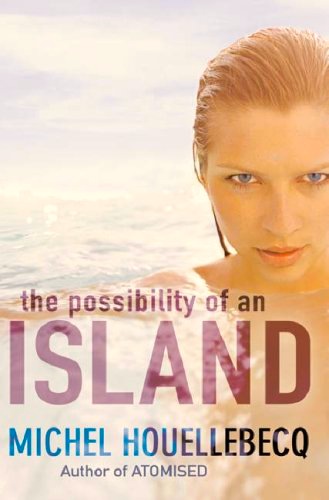By David Ross. With John Updike, J.G. Ballard, and David Foster Wallace gone to their reward, I have settled on Richard Wilbur, Thomas Pynchon, and Michel Houellebecq as my favorite living authors, though not without reservations. French debauchees with middling literary talent at the sentence level are not my usual cup of tea, but Houellebecq is such a savage hater of modernity, such a mordant, devastating analyst of European ennui. He understands that the collapse of our master narratives leaves us only a few squalid makeshifts in place of the old meaning of life, and he definitively presents, like a head on a plate, the spectacle of rootless, mindless, affectless post-Christian Europe (see here for my previous comments). I appreciate his honesty, his disgust, his discerning sense of cultural calamity.
The Paris Review has published a long interview (see here) that includes several comments worth pondering. It has often occurred to me that Houellebecq is fundamentally conservative. Certainly his critique of European post-modernity (post-humanity?) aligns him with a certain kind of conservative anti-modernism, including my own. Houellebecq gives this account of himself:
Paris Review: They say that you are on the right politically because in The Elementary Particles you seem to be against the liberalism of the sixties. What do you think of that interpretation?
Houellebecq: What I think, fundamentally, is that you can’t do anything about major societal changes. It may be regrettable that the family unit is disappearing. You could argue that it increases human suffering. But regrettable or not, there’s nothing we can do. That’s the difference between me and a reactionary. I don’t have any interest in turning back the clock because I don’t believe it can be done. You can only observe and describe. I’ve always liked Balzac’s very insulting statement that the only purpose of the novel is to show the disasters produced by the changing of values. He’s exaggerating in an amusing way. But that’s what I do: I show the disasters produced by the liberalization of values.
Houellebecq is indeed a chronicler of “the disasters produced by the liberalization of values,” and his books, I would say, belong to the literature of trauma. His rigorous amorality and joyless pornography are likely to appall conservatives, but the impulse to “observe and describe” – and sometimes satirize – must not be confused with acceptance or even celebration of a society reduced to hedonism and social atomism. Disporting with Thai prostitutes is to make the best of a fallen world, or perhaps to rub one’s own face, not unpainfully, in the impossibility of something more or better.
Another important self-insight:
Houellebecq: It may surprise you, but I am convinced that I am part of the great family of the Romantics.
Paris Review: You’re aware that may be surprising?
Houellebecq: Yes, but society has evolved, a Romantic is not the same thing that it used to be. Not long ago, I read de Tocqueville’s Democracy in America. I am certain that if you took, on the one hand, an old-order Romantic and, on the other hand, what de Tocqueville predicts will happen to literature with the development of democracy taking the common man as its subject, having a strong interest in the future, using more realist vocabulary you would get me.
Paris Review: What is your definition of a Romantic?
Houellebecq: It’s someone who believes in unlimited happiness, which is eternal and possible right away. Belief in love. Also belief in the soul, which is strangely persistent in me, even though I never stop saying the opposite.
 Houellebecq’s identification with ‘the great family of romantics’ is a sly bit of self-understanding. He belongs to what I call the school of thwarted aspiration, following in a line that includes Wordsworth, Byron (in his primary mode), and Tennyson. In this tradition, the poet yearns desperately for transcendence but lacks the imaginative energy or ingenuity to realize his desire (“I don’t have any interest in turning back the clock because I don’t believe it can be done,” as Houellebecq says). The thwarted poet may ponder the psychology of his own failure (Wordsworth passim); descend into insincerity and evasion (“Hide me from my deep emotion, O though wondrous Mother-Age!” cries Tennyson); adopt some consolatory strategy (Wordsworth’s feeble embrace of the “still, sad music of humanity”); or harbor an implacable, sullen resentment against the limiting order of nature (Byron, George Sand’s Lelia). Houellebecq embodies a combination of these poses. His libertinage affords both escape and consolation, though this consolation, like Wordsworth’s, is always self-conscious and melancholy; his libertinage also functions, much like Byron’s, as a protest, a gesture of disrespect and disobedience – a poke … well, not in the eye.. What makes Houellebecq unique as well as perplexing is the near-complete submersion of his romantic aspiration (“I never stop saying the opposite”), which speaks to the impossibility of enacting or even expressing a romantic program in the postmodern context.
Houellebecq’s identification with ‘the great family of romantics’ is a sly bit of self-understanding. He belongs to what I call the school of thwarted aspiration, following in a line that includes Wordsworth, Byron (in his primary mode), and Tennyson. In this tradition, the poet yearns desperately for transcendence but lacks the imaginative energy or ingenuity to realize his desire (“I don’t have any interest in turning back the clock because I don’t believe it can be done,” as Houellebecq says). The thwarted poet may ponder the psychology of his own failure (Wordsworth passim); descend into insincerity and evasion (“Hide me from my deep emotion, O though wondrous Mother-Age!” cries Tennyson); adopt some consolatory strategy (Wordsworth’s feeble embrace of the “still, sad music of humanity”); or harbor an implacable, sullen resentment against the limiting order of nature (Byron, George Sand’s Lelia). Houellebecq embodies a combination of these poses. His libertinage affords both escape and consolation, though this consolation, like Wordsworth’s, is always self-conscious and melancholy; his libertinage also functions, much like Byron’s, as a protest, a gesture of disrespect and disobedience – a poke … well, not in the eye.. What makes Houellebecq unique as well as perplexing is the near-complete submersion of his romantic aspiration (“I never stop saying the opposite”), which speaks to the impossibility of enacting or even expressing a romantic program in the postmodern context.
While on literary subjects, I want to say a word about Jonathan Franzen. Several years ago, I tried to read The Corrections. It was so shabby and brainless l that I could manage only ten pages. The Atlantic has come around to my view and takes a vicious clawed swipe at Franzen (see here). Is The Atlantic morphing into a conservative New Yorker? Maybe so. More and more it seems to be filled with politically incorrect raised hackles. I will have to pay more attention. I look forward to a similar article on Dave Eggers, the most foppish and ridiculous of literary impostors.
The Boston Globe, finally, has this fond piece on David Markson’s library and the strange afterlife of authors’ book collections. Markson, who died in June, was a legitimate loss. His novel Wittgenstein’s Mistress (1988) has a gradually waxing reputation as a minor masterpiece. David Foster Wallace listed it among his five direfully underappreciated U.S. novels (see here). It’s been on my reading list for fifteen or twenty years. Markson’s death has prompted me to jump it to the top and I hope to read it soon. I primarily know Markson as a scholar and advocate of Malcolm Lowry, in which capacity he did yeoman’s work.
Posted on September 30th, 2010 at 10:19am.

Ah, refreshing to see the one place covering what most conservative entertainment sites skip: literary fiction. Movies? Yeah that’s covered. Music? Get some voices here and there. Non-fiction? The genre is bursting at the seams. But no one seems to discover time to discuss literary fiction from a conservative viewpoint. Bravo and thanks for filling that need.
When I first set out writing a novel, Surface (looking for a publisher), I wrote what I thought I was. In other words, I wrote internally. When I wrote my second novel, Fallen Deep (also looking for a publisher), I wrote what I thought the world was. In other words, I wrote externally. Now, I’m writing my third novel, Let Go and I’m writing what I want the world to be. It is by far the hardest thing to do because despite being incredibly happy with my life, my wife, my family, I’m describing an optimistic world that I don’t believe in, one of a not-so-super hero that will overcome his own self imposed limitations and become what he should have been all along and be something greater than he ever imagined. Yet, I find my thoughts dwelling on the ultimate hopelessness of hanging on to anything of any importance in the world outside of my own hands. So in that vein, I’m a little Dagny Taggart, not quite ready to go on strike from the world but clearly aware that the battle is monumental in scope.
I think that leaves me a little timid to read Houellebecq’s works as you’ve described, because I can see myself moving to where he is and as natural as it seems, I’m resisting the urge to give in. I can see my soon-to-be self talking to my current self in the future and saying there is no difference between us except the fact that you still think you can change the world for the better. But it’s definitely a subject I’m infinitely interested in and I will certainly read his works at some point. Thanks for the post Mr. Ross.
Thanks David. I’m clipping out several of your paragraphs and storing them in my wallet as useful banter during faculty parties and for chatting up art girls.
I never heard of Houellebecq until today, but you make him seem worth investigating.
I think he’s confusing a romantic with a libertine (however ethical) or sensualist. I did look up the word and I suppose it might be partly the same technically. But, I think a romantic while enjoying life along the way believes in an noble ideal for which to strive that defies the easier path whereas a libertine or sensualist is less serious and more hedonist (not in an unethical way).
Regarding your assessment of Houellebecq’s “middling literary talent at the sentence level,” do you read his novels in French, or in English?
If the former, would you mind telling us, as a point of reference, which French-language authors you believe have demonstrated first-rate literary talent at the sentence level?
If the latter, well…never mind.
I ask because I think Houellebecq’s translators do only a passable job of rendering his precise and often startling French sentences into ordinary, flat English prose. But I’d find perplexing any critique of a writer’s sentence-level literary ability that was based on mere translated text.
interesting post..I feel a romantic while enjoying life along the way believes in an noble ideal for which to strive that defies the easier path whereas a libertine or sensualist is less serious and more hedonist.